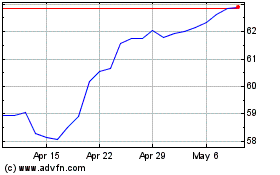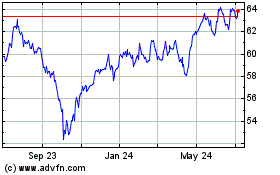Coca-Cola Opens Gaza Strip Bottling Factory
November 30 2016 - 12:35PM
Dow Jones News
By Rory Jones
GAZA CITY-- Coca-Cola Co. and its Palestinian franchise operator
have opened a $20 million bottling factory in the conflict-ravaged
Gaza Strip, investing in a market where half the population
receives international aid assistance.
National Beverage Co., Coke's Palestinian partner, transports
cans and plastic bottles of the drink firms' products on trucks
from the West Bank that are loaded and unloaded several times for
security reasons, adding to costs, said Zahi Khouri, the company's
head.
The plant's opening on Wednesday was hailed by the company as a
symbol of hope after three wars in a decade between Israel and
Gaza's ruler, Hamas, decimated the strip's commercial
industries.
"We see the reality of the living conditions," said Mr. Khouri.
"[But] what we are doing in Gaza will be to our benefit."
The plant opens at a difficult time, however. A gradual easing
by Israel on restrictions on goods and people moving in and out of
Gaza that began after a war in 2014 has come to an abrupt halt,
slowing economic growth, Western diplomats and international aid
agencies say.
In August, Israel accused an employee of Christian aid group
World Vision of siphoning off more than $50 million of charity
funding to Hamas over more than five years, in charges that shocked
aid agencies working in the Palestinian territories.
Since then, Israel has limited goods moving in and out of Gaza
and increasingly denied permits for Palestinians traveling between
the strip and the West Bank for commercial deals, aid agencies and
diplomats say. Some 8,400 truckloads of goods entered Gaza from
Israel last month, compared with roughly 13,000 in August,
according to Gisha, a nongovernmental group that tracks movement
into the strip.
A spokeswoman for Israel's military administration that oversees
access to Gaza didn't immediately respond to the request for
comment on the changes.
Israel stringently checks goods going into Gaza to ensure they
can't be used by Hamas, which has been building underground tunnels
to penetrate Israel and launch attacks against its population. The
U.S. designates the Islamist group a terrorist organization.
The Gaza plant, unlike three other production facilities in the
Palestinian West Bank, will use returnable glass bottles as getting
raw materials into Gaza for canned and plastic products is
difficult, according to the plant's manager.
The glass-bottled Coke will be cheaper than similar plastic and
canned products that will continue to be shipped into Gaza
depending on demand, Mr. Khouri added. Some 3 million glass bottles
of Coke will circulate around Gaza as the factory ramps up
production.
Coke joined with Mr. Khouri in the Palestinian territories in
1998. In a deal similar to other markets around the world, Mr.
Khouri invested in building the plant while the drinks giant pays
for marketing and sales campaigns.
Write to Rory Jones at rory.jones@wsj.com
(END) Dow Jones Newswires
November 30, 2016 12:20 ET (17:20 GMT)
Copyright (c) 2016 Dow Jones & Company, Inc.
Coca Cola (NYSE:KO)
Historical Stock Chart
From Mar 2024 to Apr 2024

Coca Cola (NYSE:KO)
Historical Stock Chart
From Apr 2023 to Apr 2024
